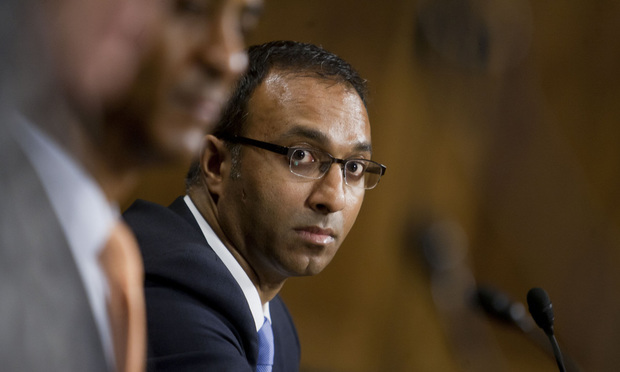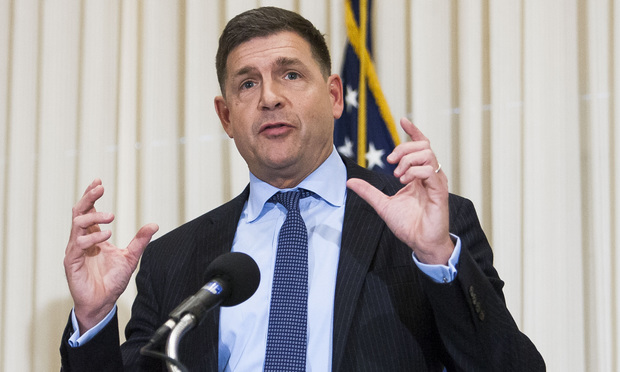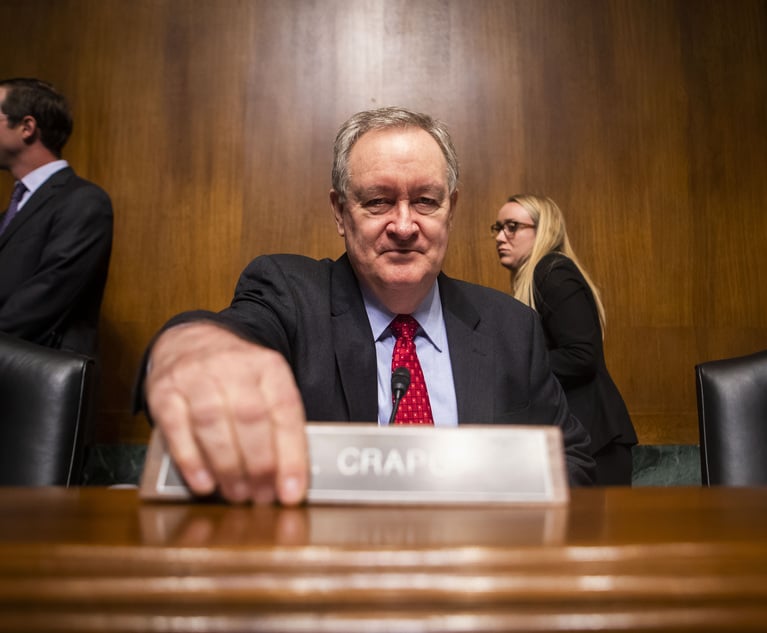King & Spalding Drops Fee Request After Judge Orders Billing Rates Unsealed
"As reflected by an internet search utilizing the term 'King and Spalding billing rates,' King & Spalding has publicly filed its billing rates in other cases," the U.S. Justice Department argued, opposing the firm's effort to seal documents in a public records lawsuit.
April 08, 2020 at 10:50 PM
6 minute read
 U.S. District Judge Amit Mehta of Washington. (Photo: Diego M. Radzinschi/ALM)
U.S. District Judge Amit Mehta of Washington. (Photo: Diego M. Radzinschi/ALM)
King & Spalding has withdrawn a request for $665,000 in legal fees in a long-contested public records dispute after a Washington federal trial judge said the law firm cannot shield its billing rates and other information from public scrutiny.
U.S. District Judge Amit Mehta said the public should be able to see two documents the Am Law 100 firm filed in support of its request for attorney fees in a suit involving a medical device client. Those filings, including a declaration from a white-collar partner, would have been made public on April 9 if the law firm had not withdrawn its request for fees.
"What plaintiff fails to appreciate is that the public interest in disclosure is arguably at its zenith when the fee demand is made against the public fisc," Mehta wrote in his April 7 order. "Indeed, there is something untoward about plaintiff asking to conceal their hourly rates and the work done from public view, while demanding hundreds of thousands of dollars from the public treasury as compensation."
Law firms and advocacy groups that sue for records often seek compensation for successful cases, and in some instances the sides agree to settle any request for compensation. Six-figure attorney fee awards in public records cases are substantially more rare than other awards, according to a 2018 report at The FOIA Project.
Mehta's ruling was a bit of a mea culpa on his part, after the judge had allowed King & Spalding to submit the two documents under seal. Mehta said his order permitting the sealing was made under the assumption that the U.S. government did not oppose the law firm filing nonpublic information. The Justice Department in February asked Mehta to reconsider the sealing order.
King & Spalding white-collar partner John Richter in Washington, a lead attorney in the case, was not reached for comment Wednesday evening.
King & Spalding sued the U.S. Department of Justice and the U.S. Department of Health and Human Services in 2016 for records about the federal investigation of the Massachusetts-based medical device company Abiomed Inc. The Justice Department investigated claims but did not bring any action against Abiomed over the marketing of the heart pump Impella 2.5, the company said in 2015.
Richter said in court filings that his law firm had a "complete" victory in its quest for documents, and that the government "dragged its feet, costing King & Spalding hundreds of thousands of dollars in attorneys' fees and costs."
"Although late-coming, the released documents have shed light on matters of public concern," the firm said in its court papers seeking legal fees. "As King & Spalding long suspected, the government attorneys spearheading the Abiomed investigation acted at the urging of a former colleague who had left the Justice Department for private practice."
The firm said its request for $664,955 in legal fees was "reasonable under the circumstances of this case." The firm argued in court filings: "The reasonableness of the government's legal position thus pales in comparison to its unreasonable and obdurate stall tactics. Those tactics will go unchecked unless this court awards King & Spalding reasonable fees and costs for its trouble."
 King & Spalding's John Richter at the National Press Club in 2016. Credit: Diego M. Radzinschi / ALM
King & Spalding's John Richter at the National Press Club in 2016. Credit: Diego M. Radzinschi / ALMKing & Spalding maintained that any public disclosure of hourly rates and "other details will harm the firm's standing with respect to its competitors." The sealed material detailed "the attorneys, rates, tasks, time, and other costs and expenses devoted to this litigation over the course of its long history."
Justice Department lawyers argued that secrecy about King & Spalding's billing rates and other information "will hamstrung defendants from fully arguing in their publicly filed opposition the reasons why the time incurred is patently unreasonable." The government also pointed to public court filings in other cases where King & Spalding's rates were revealed.
"As reflected by an internet search utilizing the term 'King and Spalding billing rates,' King & Spalding has publicly filed its billing rates in other cases, undermining the assertion of competitive harm in its motion to seal," Jeremy Simon, an assistant U.S. attorney, said in a filing.
Mehta concluded the firm's billing records "go to the very heart of what is before the court: questions concerning the reasonableness of plaintiff's counsel's hourly rates and the reasonableness of the time they expended on this matter."
On Wednesday evening, when King & Spalding withdrew its request for attorney fees, Richter asked Mehta to order the Justice Department and HHS to "destroy all copies of the sealed exhibits in their possession." The judge had not immediately responded.
Mehta on Thursday said the Justice Department has until April 16 to say whether it opposes King & Spalding's request that pleadings be "destroyed." The two filings, until then, will remain under seal, the judge said.
King & Spalding, home to an array of former government officials, including former U.S. deputy attorneys general Rod Rosenstein and Sally Yates, employs more than 1,100 lawyers. Profits per equity partner at the firm hit $3 million in 2019, according to ALM reporting. Revenue per lawyer was reported at about $1.1 million.
Read more:
What New Supreme Court Cases Reveal About Big Law Billing Rates
Hourly Billing Rates, Latest Engagements: New and Notable FARA Filings
FBI Chief of Staff's King & Spalding Income Revealed in New Disclosure
Chris Wray, FBI Director, Banked $14M From King & Spalding Since 2016
King & Spalding Takes Feds to Court Over Heart-Device Investigation Docs
This content has been archived. It is available through our partners, LexisNexis® and Bloomberg Law.
To view this content, please continue to their sites.
Not a Lexis Subscriber?
Subscribe Now
Not a Bloomberg Law Subscriber?
Subscribe Now
NOT FOR REPRINT
© 2025 ALM Global, LLC, All Rights Reserved. Request academic re-use from www.copyright.com. All other uses, submit a request to [email protected]. For more information visit Asset & Logo Licensing.
You Might Like
View All
Senator Plans to Reintroduce Bill to Split 9th Circuit

Three Akin Sports Lawyers Jump to Employment Firm Littler Mendelson

Brownstein Adds Former Interior Secretary, Offering 'Strategic Counsel' During New Trump Term
2 minute readLaw Firms Mentioned
Trending Stories
- 1SurePoint Acquires Legal Practice Management Company ZenCase
- 2Day Pitney Announces Partner Elevations
- 3The New Rules of AI: Part 2—Designing and Implementing Governance Programs
- 4Plaintiffs Attorneys Awarded $113K on $1 Judgment in Noise Ordinance Dispute
- 5As Litigation Finance Industry Matures, Links With Insurance Tighten
Who Got The Work
J. Brugh Lower of Gibbons has entered an appearance for industrial equipment supplier Devco Corporation in a pending trademark infringement lawsuit. The suit, accusing the defendant of selling knock-off Graco products, was filed Dec. 18 in New Jersey District Court by Rivkin Radler on behalf of Graco Inc. and Graco Minnesota. The case, assigned to U.S. District Judge Zahid N. Quraishi, is 3:24-cv-11294, Graco Inc. et al v. Devco Corporation.
Who Got The Work
Rebecca Maller-Stein and Kent A. Yalowitz of Arnold & Porter Kaye Scholer have entered their appearances for Hanaco Venture Capital and its executives, Lior Prosor and David Frankel, in a pending securities lawsuit. The action, filed on Dec. 24 in New York Southern District Court by Zell, Aron & Co. on behalf of Goldeneye Advisors, accuses the defendants of negligently and fraudulently managing the plaintiff's $1 million investment. The case, assigned to U.S. District Judge Vernon S. Broderick, is 1:24-cv-09918, Goldeneye Advisors, LLC v. Hanaco Venture Capital, Ltd. et al.
Who Got The Work
Attorneys from A&O Shearman has stepped in as defense counsel for Toronto-Dominion Bank and other defendants in a pending securities class action. The suit, filed Dec. 11 in New York Southern District Court by Bleichmar Fonti & Auld, accuses the defendants of concealing the bank's 'pervasive' deficiencies in regards to its compliance with the Bank Secrecy Act and the quality of its anti-money laundering controls. The case, assigned to U.S. District Judge Arun Subramanian, is 1:24-cv-09445, Gonzalez v. The Toronto-Dominion Bank et al.
Who Got The Work
Crown Castle International, a Pennsylvania company providing shared communications infrastructure, has turned to Luke D. Wolf of Gordon Rees Scully Mansukhani to fend off a pending breach-of-contract lawsuit. The court action, filed Nov. 25 in Michigan Eastern District Court by Hooper Hathaway PC on behalf of The Town Residences LLC, accuses Crown Castle of failing to transfer approximately $30,000 in utility payments from T-Mobile in breach of a roof-top lease and assignment agreement. The case, assigned to U.S. District Judge Susan K. Declercq, is 2:24-cv-13131, The Town Residences LLC v. T-Mobile US, Inc. et al.
Who Got The Work
Wilfred P. Coronato and Daniel M. Schwartz of McCarter & English have stepped in as defense counsel to Electrolux Home Products Inc. in a pending product liability lawsuit. The court action, filed Nov. 26 in New York Eastern District Court by Poulos Lopiccolo PC and Nagel Rice LLP on behalf of David Stern, alleges that the defendant's refrigerators’ drawers and shelving repeatedly break and fall apart within months after purchase. The case, assigned to U.S. District Judge Joan M. Azrack, is 2:24-cv-08204, Stern v. Electrolux Home Products, Inc.
Featured Firms
Law Offices of Gary Martin Hays & Associates, P.C.
(470) 294-1674
Law Offices of Mark E. Salomone
(857) 444-6468
Smith & Hassler
(713) 739-1250











